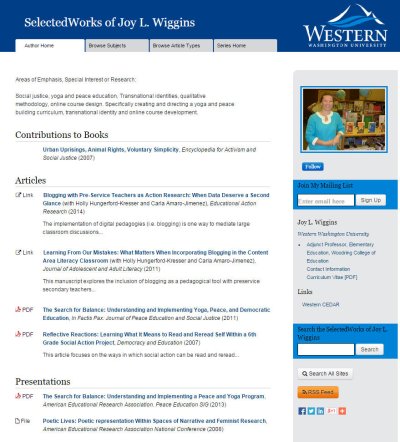Western CEDAR and SelectedWorks: sharing Western’s work with the world
One need only glance at the “Faculty Notes” page of Western Today to get a sense of the depth and range of research, scholarship and creative works that Western Washington University's faculty are producing. Western CEDAR, Western Washington University’s institutional repository, is one way Western can share these innovative and engaging outputs with the world. Part of a global movement promoting open access to scholarship and creative works, Western CEDAR is a service of Western Libraries, in partnership with the Graduate School, Office of the Provost, and Office of Research and Sponsored Programs.
Since its launch last fall, CEDAR’s implementation team has been working diligently with Western faculty and staff to both create SelectedWorks pages and also add content to the repository that will help make the scholarly and creative work of Western’s community accessible to everyone.
"So much is made about the teaching-learning mission of the university," explained Francisco Rios, Dean of Woodring College of Education. "But I’m constantly amazed at the quality and quantity of academic scholarship that is produced at Western. This allows us, in one place, to begin to tell the story of the university’s collective efforts to engage in the production of new knowledge, and to share that broadly."
CEDAR’s SelectedWorks feature allows faculty from Western to share their work and expand their readership. Articles published in peer-reviewed journals that are added to CEDAR are search-engine optimized for maximum exposure, meaning they have the potential to receive increased readership beyond the discipline-specific journal in which they were first published.
While one of the goals of CEDAR is to make scholarship available and accessible to anyone in the world, a local benefit of using SelectedWorks is that it provides scholars at Western an opportunity to discover what their colleagues here at Western are researching and creating. Elementary Education Professor Joy Wiggins explained how CEDAR helps connect faculty across the university, enabling them to recognize how their work intersects with other disciplines.
"My research intersects with anthropology, sociology, psychology and even political science, and it just makes sense for me to seek research outside of education," she said. "We tend to stay encapsulated in our disciplines and respective departments because we are so busy just teaching, attending to service and squeezing in our writing that we sometimes forget to look up from our desks and seek other like-minded folks from different disciplines that bring a whole new, fresh insight to our work. That’s what’s so exciting to me. CEDAR is one way to connect us."
Faculty who create SelectedWorks pages can showcase their scholarly and creative works by displaying them in a customized format organized according to the categories they decide to highlight, (such as: areas of research and expertise, awards and honors, publications, bibliographies, Curriculum Vitae, or lists of links to additional information). SelectedWorks pages also allow scholars to easily cultivate their own network of followers by inviting contacts to join their announcement network, or follow them via RSS feed or email.
Environmental Sciences Professor Robin Matthews’ SelectedWorks page includes something entirely unique since she is the author of the very first book ever published in CEDAR, a taxonomy guide to local algae that includes hundreds of high resolution color images. The book can be downloaded electronically to a computer or mobile device, and it was created with active links, which make it easy to use.
“Putting the book on CEDAR solved a huge problem I was facing: how to make the book accessible to students and other professionals at a low or no cost and without loss of quality. Printing this type of book would be prohibitively expensive, assuming I could even find a publisher interested in the project,” explained Matthews.
Not only was Matthews able to create something she uses in her own teaching, she has also connected with others outside of the United States who have told her that her book has helped them in teaching their students algal taxonomy. Currently, publications from Western Washington University's faculty, staff and students, including Western's Masters Thesis Collection, are being downloaded by people from all over the world. CEDAR's website includes a dynamic map that begins with the previous days' downloads before switching to real-time activity, so you can see for yourself the global impact of the work being done at Western.
“Ultimately, this is about providing access to the broadest range of one’s scholarship to as many people as possible," Rios said. "As an educational institution, we have a commitment and obligation to generate new knowledge. But that knowledge, to have impact, needs to be shared with as many others as possible. And others need to be able to access that knowledge."
Cedar’s implementation team at Western Libraries is available to assist you in if you are interested in creating a SelectedWorks page to showcase your work, or if you have any questions about Western CEDAR. Please contact Western Libraries Scholarly Communication Librarian, Jenny.Oleen@wwu.edu or Western CEDAR Manager Kim.Marsicek@wwu.edu for more information.
